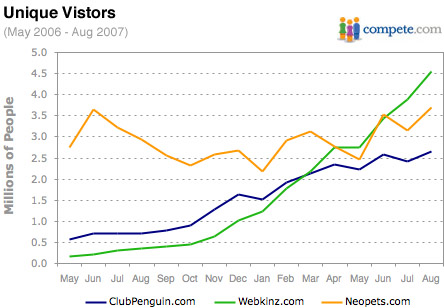Monday, October 8th, 2007
I’ve been looking for a resource that offers up the history of Club Penguin, the successful children’s social networking business recently acquired by Disney. I’ve also been interested in finding data which follows Club Penguin’s web growth since its launch. Having found only a snapshot in time posted here and a sprinkling of data displayed there, I decided pull together my own resource assembled from hundreds of web pages I’ve visited on the topic.
Company History
First, I’ll offer a chronological history of how Club Penguin came to be. Then I’ll present recorded web metrics of the Club Penguin site. Onto the history…
| Date | Noteworthy Fact |
|---|---|
| 1984 | Dave Krysko, one of the three founders of Club Penguin (CP), opens a business called New Horizon Productions (NHP). This business specializes in video production and editing services. NHP becomes New Horizons Interactive in 2005, the company that launches Club Penguin. |
| 1995 | Lane Merrifield, the second of the three CP founders, starts working at Disneyland in southern California, an experience Lane mentions in articles that is important to the shaping of the ideals of Club Penguin. |
| October 1999 | Lance Priebe, the third of the three CP founders, starts up an online gaming business called RocketSnail Games. |
| July 2000 | A very early online multi-user communication program called Experimental Penguins, developed by Lance Priebe, first appears on RocketSnail. This chat program is a very early functioning prototype of the future Club Penguin service. |
| September 15, 2000 | Experimental Penguins wins its first award, the Cool Site of the Day. |
| September 30, 2000 | The RocketSnail website mentions that in the last month Experimental Penguins has received more than “25, 000 visitors spending an average of 20 minutes each” using the game. |
| July 2001 | Experimental Penguins goes offline due to growing traffic to the game and costs related to bandwidth. |
| July 2001 | An updated version of Experimental Penguin gets its own website. This new version of Eperimental Penguin is renamed Penguin Chat. |
| January 2003 | Public testing of Penguin Chat begins. |
| 2003 | A recent article I came across which mentions when the three founders from Club Penguin came up with the idea for the online business:
|
| April 2004 | RocketSnail develops a kids’ safe version of Penguin Chat for the company KidZap |
| January 2005 | New Horizon Productions launches its new website as New Horizons Interactive (NHI). Projects found in their portfolio include two orthographic room building tools, a component often found in online social networking experiences. One tool for designing a wine cellar and another for building a park. The New Horizon office comtinues to be located in Kelowna, British Columbia and the NHI “start up” receives no venture capital financing. |
| October 24, 2005 | The first Club Penguin site is launched through NHI. |
| May 2007 | NHI begins discussions with a number of companies to find a strategic partner who would acquire Club Penguin and provide support for even greater expansion of the Club Penguin service. Press announcements report that NHI made $60 million in revenues from CP for 2006. |
| June 22, 2007 | The RocketSnail website closes. |
| August 1, 2007 | Disney and NHI announce that Disney will be acquiring Club Penguin for $350 million in cash and an additional $350 million in earn outs if Club Penguin hits certain performance targets by 2009. It’s announced that Club Penguin has 12 million registered members and has over 700, 000 paid subscribers to its service. Also announced is that Club Penguin expects to make $35 million in profit off revenues of $65 million within 2007. |

Another noteworthy item not often mentioned in articles about Club Penguin is the spirit of giving started by the founders which supports child-focused charitable work in developing countries:
“Lane Merrifield, Dave Krysko and Lance Priebe each stand to receive about $115 million for the two-year-old self-funded virtual world. 10 percent of CP’s net profits already go to charity, primarily through a foundation started by the three. Merrifield confirmed that 10 percent of the amount each makes from the sale will go to the foundationmore than $30 million from the cash payout. ‘It’s something we’ve done all along. We never wanted it to be seen as a marketing gimmick. … It’s part of our DNA.’ “
Club Penguin’s Web Metrics
Next, onto the web data. In almost all of the articles reviewed, either Nielsen//NetRatings or comScore Media Metrix is cited for their web metrics. Other sources include Hitwise, Compete, Alexa, but how these companies offer up their data tend to be less understandable to the general public or draw upon a sample base that is too small.
It’s definitely frustrating to compare Neilsen//Netratings and comScore web measurement data sets. Why isn’t one company’s numbers equal to another? One company may be better at capturing data from the online home user than the online work user. Another may be better at capturing all of North America instead of just the US market. In almost all the articles I’ve reviewed, it is unclear if these web metrics represent just the US or all of North America unless specifically stated, though I have a hunch that comScore does a better job at capturing all of North America in their data.
Below I compare monthly unique user data provided by Neilsen//NetRatings and comScore Media Metrix on the Club Penguin website over time. Each number below provides a link to the web page where I found the data:
| Month/Year | Nielsen | comScore |
|---|---|---|
| March 2006 | 705, 000 | 899, 000 |
| April 2006 | 794, 000 | – |
| June 2006 | – | 1.8 million |
| July 2006 | 1.0 million | 1.9 million |
| August 2006 | 1.1 million | 2.1 million |
| September 2006 | 1.3 million | 2.6 million |
| October 2006 | 1.5 million | – |
| January 2007 | 2.9 million | 4.0 million |
| February 2007 | 3.2 million | – |
| March 2007 | 3.4 million | – |
| April 2007 | 4.0 million | – |
| May 2007 | – | 4.0 million |
| June 2007 | 4.2 million | 4.7 million |
| July 2007 | 4.0 million | 5.0 million |
| August 2007 | 3.9 million | – |
| September 2007 | 3.7 million | – |
| October 2007 | 3.8 million | – |
| February 2008 | 4.7 million | – |
| March 2008 | 4.6 million | – |
| April 2008 | 3.8 million | – |
| September 2008 | 4.2 million | – |

The company Hitwise is sparsely referenced in articles about CP, but the company provides helpful data about how much market share a company captures online over time compared to other sites. Here are two charts: Club Penguin’s market share data represented alone through June 2007, and comparison data against Runescape, Webkinz, Neopets, Gaia, Stardoll, and Habbo through April 2007.






And finally, below is comparison data from Compete. Compete.com is rarely referenced in articles I’ve read. This chart is interesting to look at for trending analysis only. Compete is not often used as a critical analysis tool of websites because of how it gathers its information from a small sample size. Here I compare Club Penguin against Webkinz and Neopets.





Lessons Learned
So, what do I take away from this research effort? The two year “overnight success” as stated in the press makes for great headlines, but the reality is that a lot more effort went into the development and success of Club Penguin than is acknowledged. As the tallented vaudeville comedian Eddie Cantor famously said, “It takes twenty years to make an overnight success.” This quote seems very fitting here. I wish the folks at Club Penguin continued success. May the next segment of your adventure be as exciting as the first.

